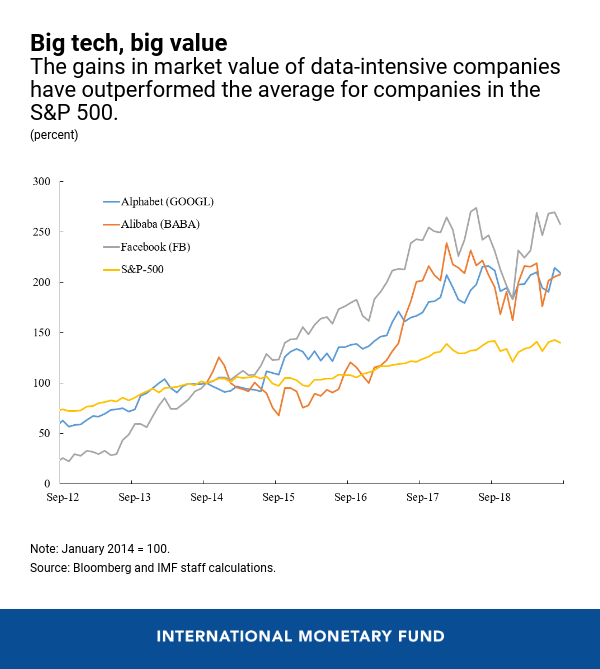What do all these valuable economic activities have in common, despite taking place on different continents and in different sectors of the economy?
Had we asked the question of global firms thirty years ago, the answer would probably have been “not much.” But today, the answer is clear. They all rely on the same indispensable input: data. And lots of it.
Global cooperation is needed to ward off the risk that the digital economy becomes fragmented, with data access limited by national borders.
Many of the world’s largest firms—both in the tech sector and elsewhere—now have data at the core of their business models. The value of data intensive companies like Alibaba, Alphabet, and Facebook has shot up. Some ask whether data is the new oil?
In our new paper, we explore some of the insights that economics gives us to think about the implications of data proliferation, and what this means for modern data policies. Cooperation between regulators, both within and across countries, will be vital to tackle the challenges associated with the increased flow of data.
First, the economics
Data is information, so collecting and trading it creates and shifts information across companies and consumers—for better and for worse. On hand-held screens around the world, social networks and search companies track their users to offer them new and individualized services they are more likely to enjoy.
Access to more data is helping level the playing field—whether this means a small startup getting a loan or a consumer informing themselves before purchasing a used car. But it can also mean that someone gets rejected for health insurance coverage or a mortgage because of their personal characteristics.
Data has become a key input in modern economic production alongside land, capital, labor, and oil. It feeds artificial intelligence algorithms whose predictions power applications from driverless cars to drug testing to credit provision to ad targeting.
But data is unlike other inputs, including oil, in important ways. The same data can be used by many people simultaneously without being depleted, which means its accumulation stands a better chance of boosting productivity and long-run growth. The value of data gets unlocked when it can be accessed by many firms or researchers, who then compete to innovate and generate knowledge.
Another way data is different is that when personal data about someone is exchanged by two companies, the transaction impacts the person’s privacy and can leave them at a strategic disadvantage. If that person isn’t compensated or even made aware of the transaction, the data market can generate undue harm that leaves us worse off.
Finally, it’s expensive to prevent the theft or misuse of data by others. Will firms spend enough to protect the data they have collected? Preserving their reputation provides a strong incentive to avoid a major data breach, but individual firms are unlikely to consider the impact of their decision on the public’s trust in the broader data economy.
Towards modernized data policies
The proliferation of data in the economy presents a tremendous opportunity to boost growth through efficiency and innovation. But to do so without compromising other objectives—privacy, equity, and stability—we argue that governments must modernize current policies to tackle three growing challenges.
- First, data markets are too opaque—while most of us participate in the data economy daily, we aren’t fully aware of how our data is used, transferred and processed. This leads to too much data collection and too little privacy. Government policies must clarify the rights and obligations over data for the market to function efficiently.
- Second, companies who build up large datasets have an incentive to hoard them. This potentially stifles competition and reduces the social benefits that could flow from wider data access. Governments can deploy a range of policies to encourage data sharing that can promote competition and innovation, while respecting privacy.
- Third, it is unclear that companies are doing enough to protect the data they hold from theft and misuse. This threatens public trust and creates risks to stability that policy measures should mitigate to ensure adequate investment in cybersecurity.
Dealing with these challenges will require cooperation, both among domestic agencies and across countries. Issues of growth, privacy, competition, and stability have traditionally been handled by separate ministries and regulators; effective data policy will require an integrated approach to manage complex trade-offs.
Global cooperation is also needed to ward off the risk that the digital economy becomes fragmented, with data access limited by national borders. If countries don’t trust how global partners handle data, they may opt to erect digital barriers that impede international data sharing, undermining innovation and efficiency.
The economics of data point to a promising future, provided we get the policies right today.







